Featured Topics
Featured Products
Events
S&P Global Offerings
Featured Topics
Featured Products
Events
S&P Global Offerings
Featured Topics
Featured Products
Events
S&P Global Offerings
Featured Topics
Featured Products
Events
Language
Featured Products
Ratings & Benchmarks
By Topic
Market Insights
About S&P Global
Corporate Responsibility
Culture & Engagement
Featured Products
Ratings & Benchmarks
By Topic
Market Insights
About S&P Global
Corporate Responsibility
Culture & Engagement
S&P Global — 20 Jan, 2023 — Global
By S&P Global
Start every business day with our analyses of the most pressing developments affecting markets today, alongside a curated selection of our latest and most important insights on the global economy.

War and Weather Woes Take Toll on Corn Supply
More than a staple diet in many parts of the world, corn, also known as maize, is grown for a variety of uses, from food and beverage sweetener to livestock feed and raw material for manufacturing ethanol and industrial products. Naturally, when this versatile crop is in short supply, prices tend to go up, and the resulting impact can ripple through the global economy.
The war in Ukraine and extreme weather took a hefty toll on corn supply and demand over the past year, and a return to normalcy is expected to take longer. Whereas it usually takes one growing season to counteract declines, restoring supply amid a prolonged period of war and weather extremes will require “two to three years of good harvests globally,” according to Pete Meyer, head of grain, oilseed and advanced feedstock analytics at S&P Global Commodity Insights.
Corn output in the U.S., the world's largest maize producer and exporter, was adversely affected by droughts during 2022’s growing season. According to data released Jan. 12 by the U.S. Agriculture Department, corn production in the country stood at 13.7 billion bushels last year, 9% lower than in 2021. Persistent dryness also presented logistical challenges for U.S. corn, resulting in increased barge freight costs, uncompetitive prices and falling export and domestic demand. Some of these impacts are expected to extend into at least the first half of 2023. As for the U.S.’ rival exporting countries, insufficient rainfall delayed maize planting in Argentina, while Brazil’s bumper safrinha crop offered some relief.
In the EU, intense droughts decreased corn yields in 2022, intensifying the region’s need for imported maize from Ukraine. But the war also diminished corn export and production capacity in Ukraine. Similarly, the Russia-Ukraine crisis made it difficult to procure grain supplies from the Black Sea region, impacting the European market for ethanol, a biofuel mainly derived from corn that is typically blended with gasoline. The European ethanol market is likely to face ongoing feedstock challenges this year and will potentially have to navigate a recessionary demand environment, according to S&P Global Commodity Insights.
For importers in Europe and North Africa, the hope is for corn exports from Ukraine to accelerate in 2023 due to the Black Sea Grain Initiative. Under this plan, commercial ships sailing to and from Ukraine's deep-sea ports need to be inspected by a team of representatives from the United Nations, Turkey, Russia and Ukraine. Slow inspections have delayed Ukraine's exporters from shipping large corn stocks harvested in the fall. About 20% of the country’s corn crop also remained on the field at the end of 2022.
Amid inflation and slow economic growth in Asia, China diversified its corn suppliers away from the U.S. and Ukraine with its first-ever shipment of Brazilian corn in November 2022. The entry of the world’s most populous country into the Brazilian maize market as a major buyer is predicted to jack up corn prices and local market competition. Vietnam’s corn imports slumped, and its exports declined in the past year, while South Korea’s import volumes held steady.
In the long term, the warming climate is seen as an ever-growing threat to corn production. Among the four major crops, which also include wheat, soybean and rice, corn stands to lose more from carbon emissions caused by climate change given its C4 photosynthetic pathway, a mechanism that concentrates carbon dioxide in the chloroplasts of plant leaf cells, according to NASA Senior Research Scientist Cynthia Rosenzweig.
Without adaptation to climate change, maize could see a 30% to 40% decline in yields at the end of the century. Managing risks will be crucial, including developing crop varieties that are tolerant to climate extremes and widening the use of genetic resources, Rosenzweig said on S&P Global Commodity Insights’ “Platts Commodities Focus” podcast.
Today is Friday, January 20, 2023, and here is today’s essential intelligence.
Written by Pam Rosacia.
Emerging Markets Monthly Highlights: Some Good News, Uncertainty Lingers
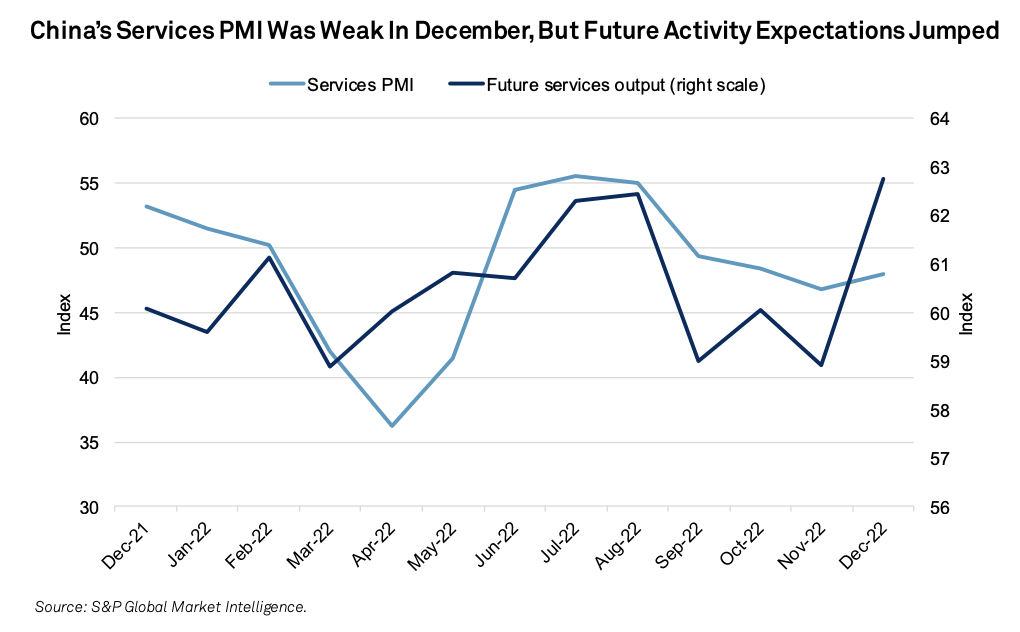
Amid expectations of rising internal demand in China and subsequent recovery of its property sector, prices for metal commodities used in construction (such as iron ore, aluminum, zinc and copper) have sharply increased this month. These developments are likely to benefit several EM metal exporters.
—Read the reports from S&P Global Ratings
Access more insights on the global economy >
Global Bank M&A In 2022 Slid Below Pandemic-Hit 2020 Levels, Lowest In 5 Years
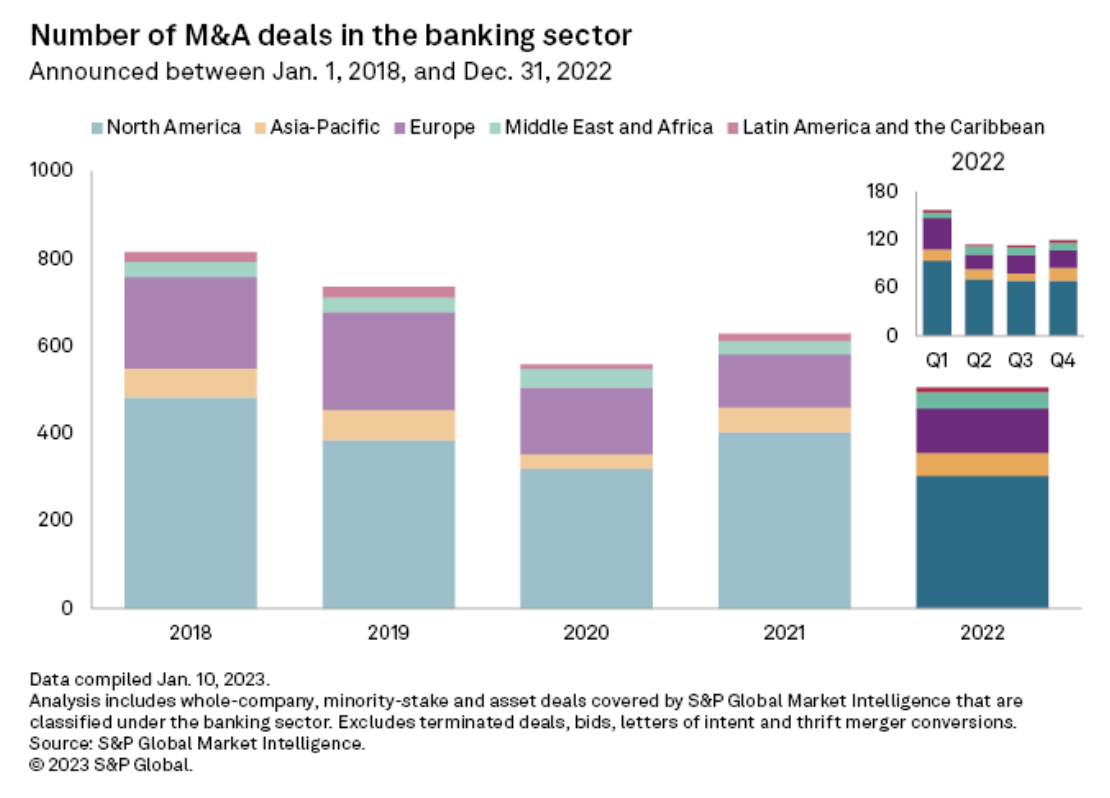
Global banking sector M&A activity has slowed in recent years with the lowest number of deals in the past five years coming in 2022, lower than the pandemic-hit 2020. The number of M&A deals in the global banking sector dropped 19.6% year over year to 505 in 2022, according to an S&P Global Market Intelligence analysis that included whole bank deals, asset sales and minority investments.
—Read the article from S&P Global Market Intelligence
Access more insights on capital markets >
Pakistan's Banking, Currency Woes Act As Stumbling Blocks For Oil Imports
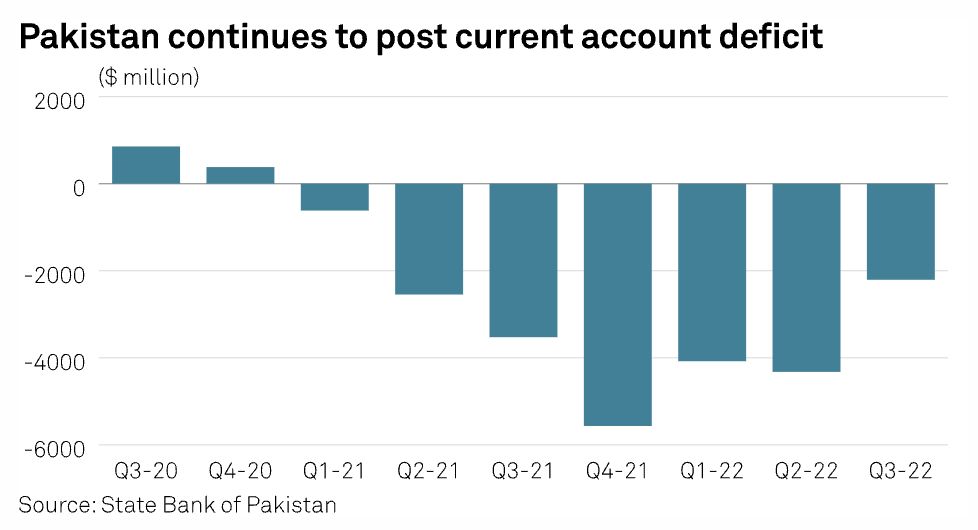
Pakistan could possibly witness fuel shortages in the near future as several oil importing companies face hurdles in securing dollars needed to close import deals, at a time when the South Asian country's foreign exchange reserves have dwindled to the lowest level in almost nine years. Sources told S&P Global Commodity Insights that the Oil Companies Advisory Council, members of refineries and oil marketing companies had written to the country's finance ministry about oil importers facing challenges in opening letters of credit for the import of petroleum products.
—Read the article from S&P Global Commodity Insights
Access more insights on global trade >
A Look At Climate-Related Disclosures In Switzerland
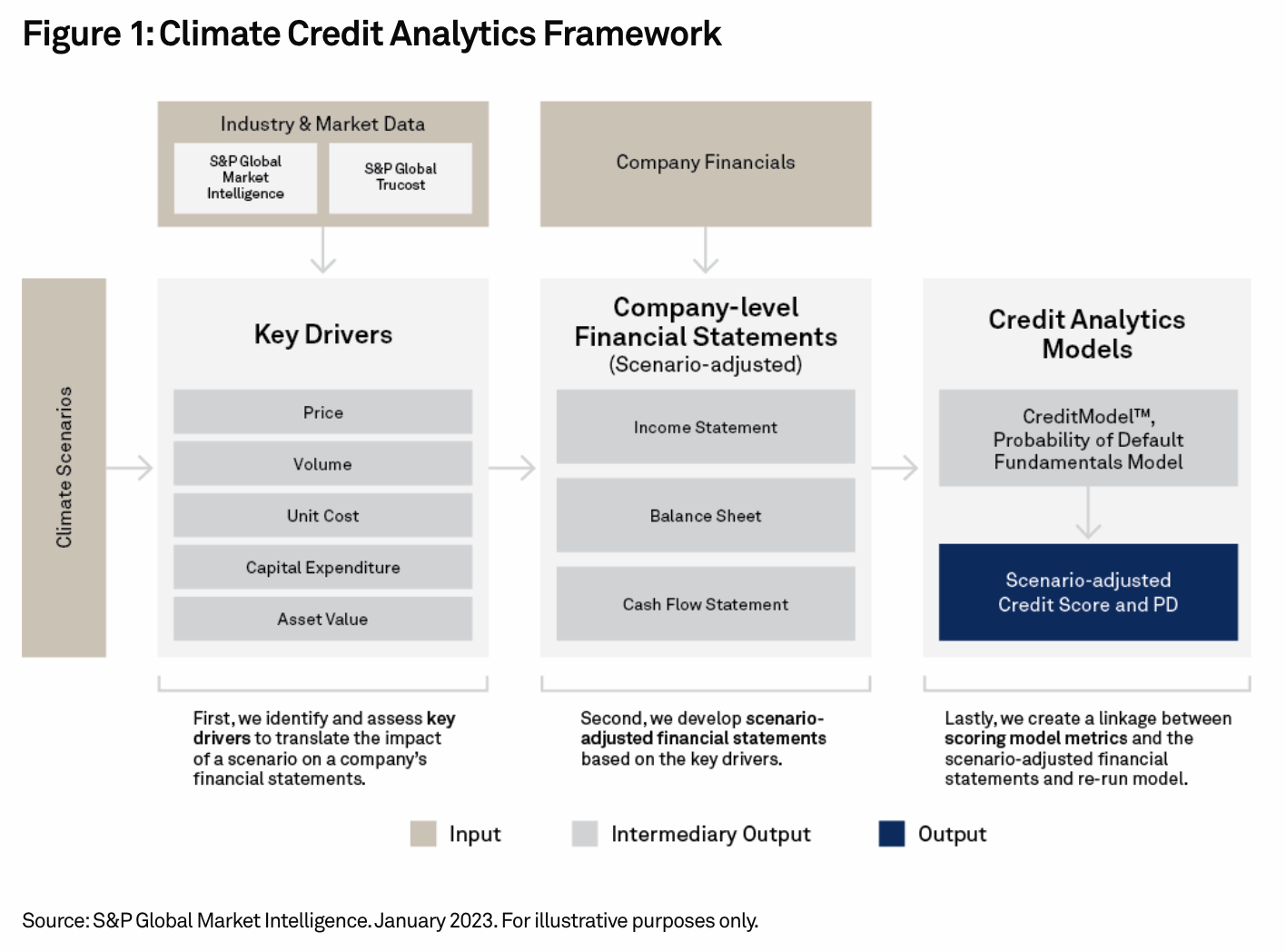
During a meeting in late November 2022, the Federal Council adopted the implementing ordinance on climate disclosures for large Swiss companies, bringing it into force as of January 1, 2024. Public companies, banks and insurance companies with 500 or more employees and at least CHF 20 million in total assets, or more than CHF 40 million in turnover, are obliged to report publicly on climate issues.
—Read the article from S&P Global Market Intelligence
Access more insights on sustainability >
Europe Still Buying Over Quarter Of Diesel Imports From Russia Ahead Of New Curbs
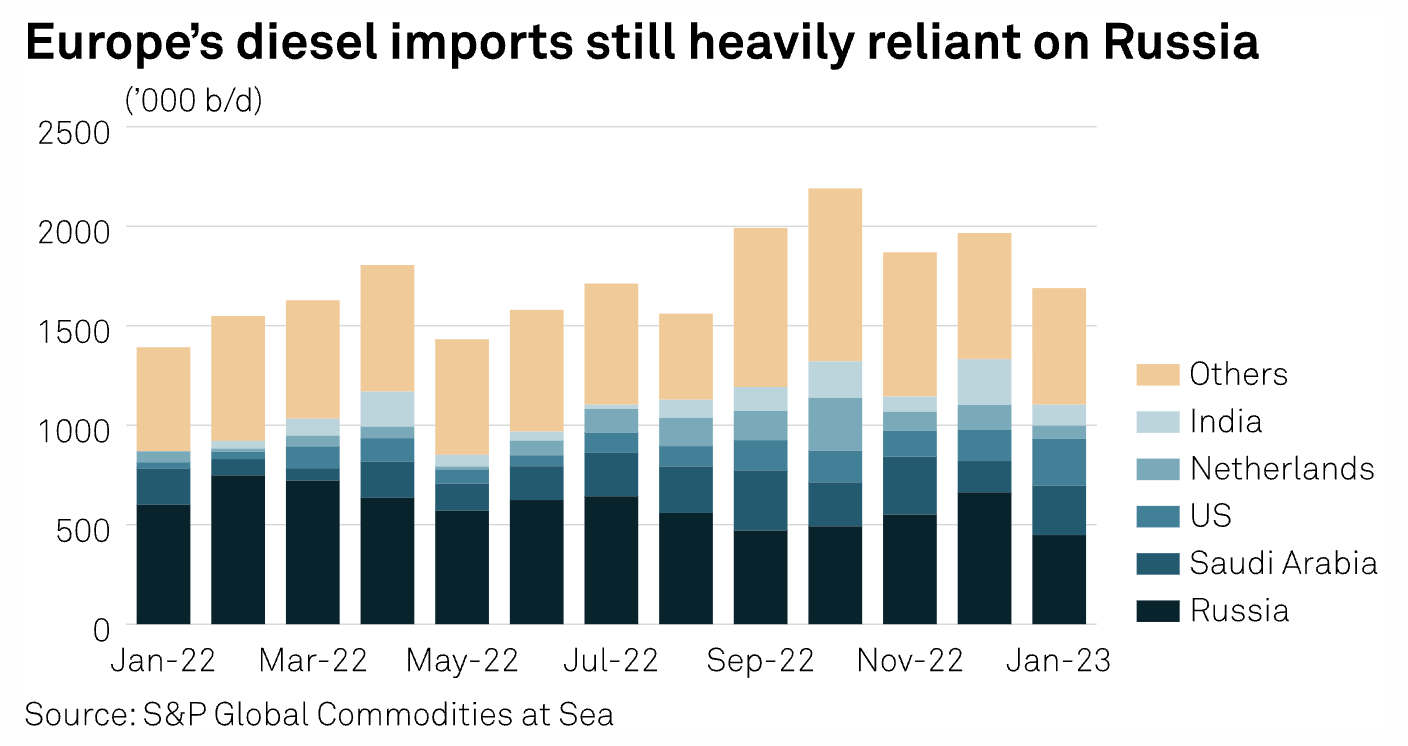
Europe continues to source more than a quarter of its diesel imports from Russia, according to tanker-tracking data, weeks before the EU's latest embargo blocking flows of Russian oil products into the trade bloc. Russian diesel exports both delivered and on route to the EU, Norway and the U.K. averaged 448,000 b/d during the first 18 days of January, down from 663,000 b/d in December and from pre-war levels of 670,000 b/d in early 2022, according to data from S&P Global Commodities at Sea.
—Read the article from S&P Global Commodity Insights
Access more insights on energy and commodities >
Pickup Owners Moving To SUVs (Like Everyone Else)
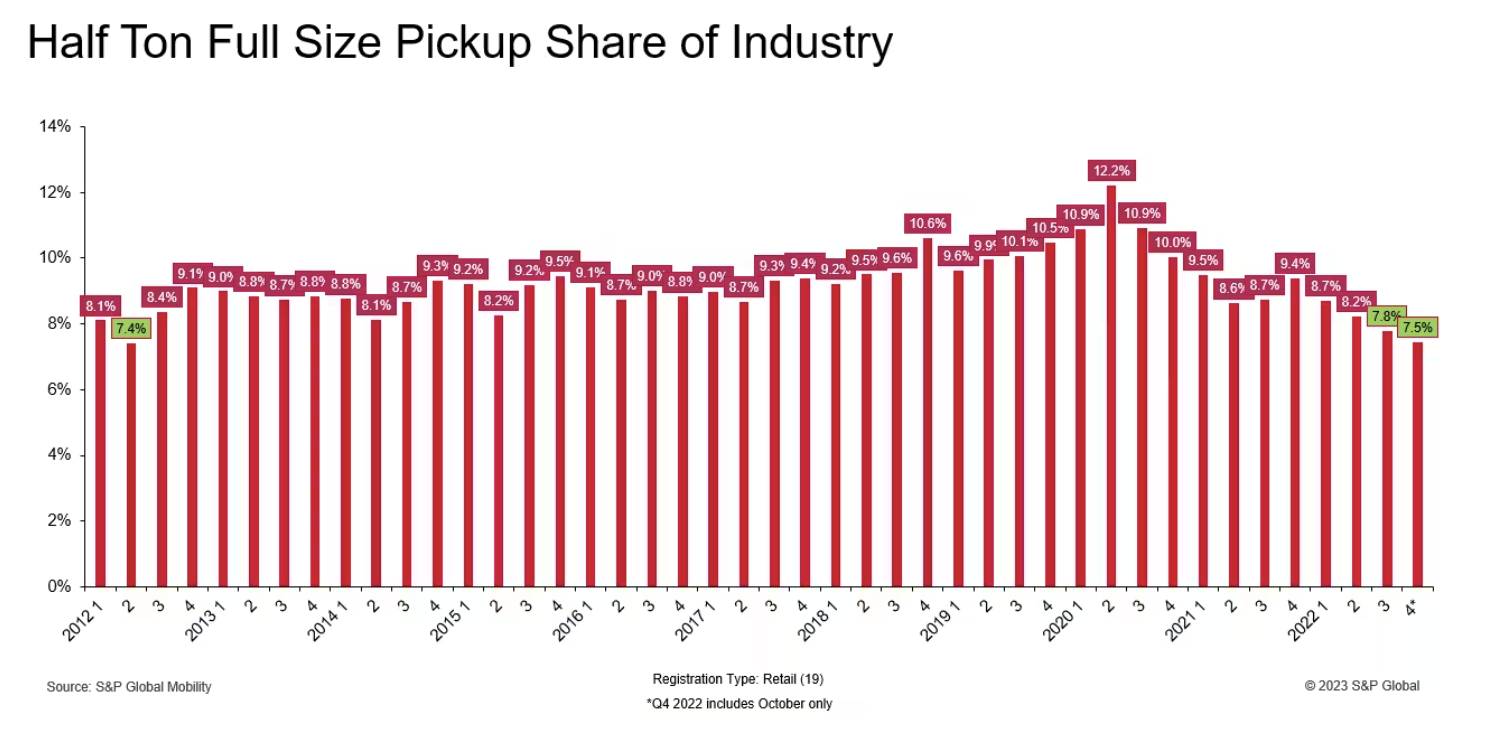
The light-duty full-size half-ton pickup segment is one of the most crucial in the U.S. industry, for several reasons: the three segment leaders are the highest-volume models from Ford, Chevrolet and Ram; the three pickups consistently also are the highest-volume models in the industry; there is intense sales competition among these three for bragging rights; and, it is commonly accepted that these models are highly profitable for their respective automakers.
—Read the article from S&P Global Mobility
Access more insights on technology and media >
CERAWeek by S&P Global — Navigating A Turbulent World: Energy , Climate and Security
Join global leaders, policymakers and executives from across energy, climate, finance, technology and industry at CERAWeek 2023 for timely dialogue, shared learning and connection.
—Register for CERAWeek
